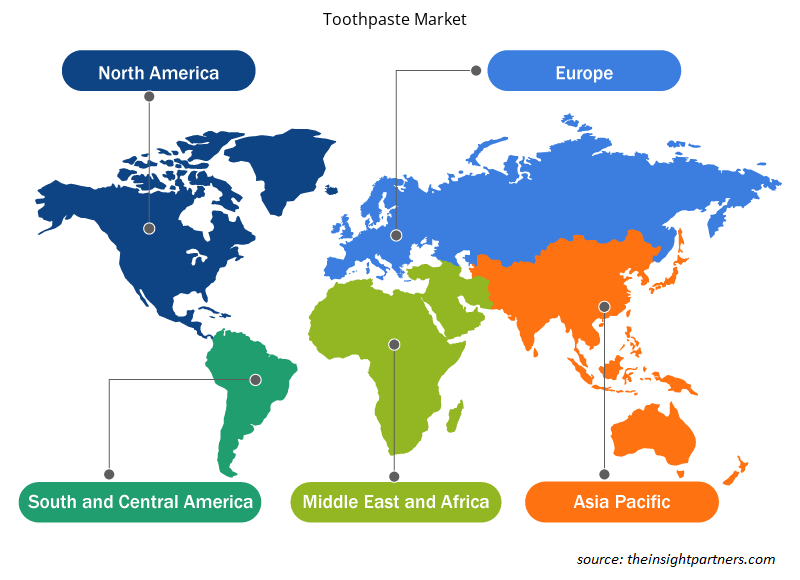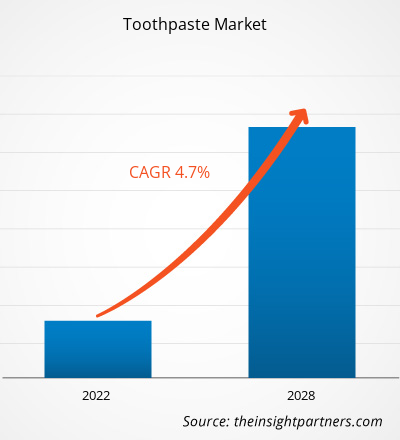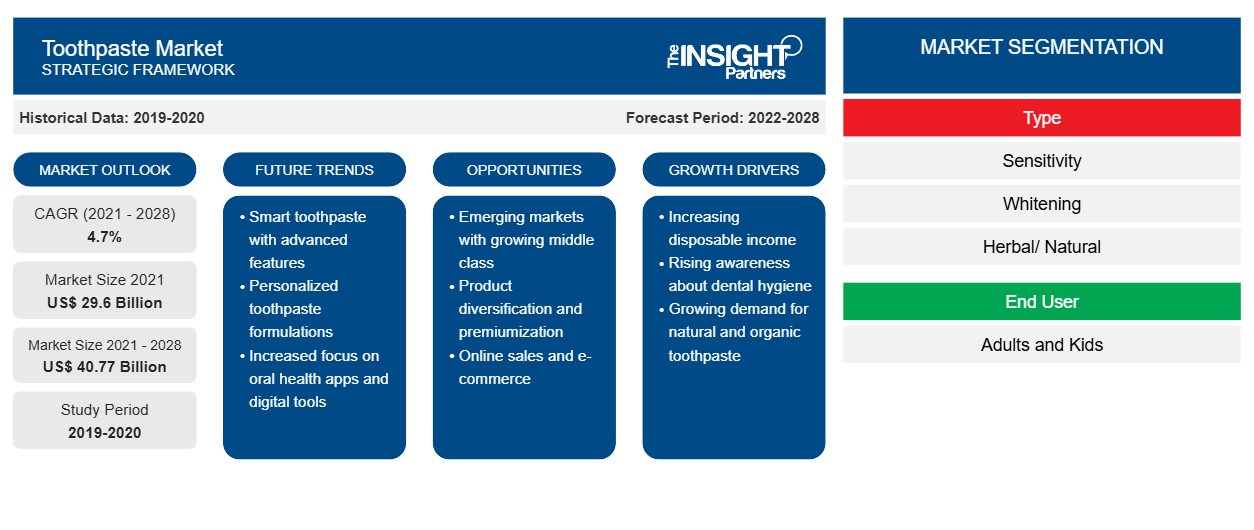[Informe de investigación] El mercado de pasta de dientes se valoró en US$ 29.598,97 millones en 2021 y se proyecta que alcance los US$ 40.766,21 millones en 2028; se espera que crezca a una CAGR del 4,7% de 2021 a 2028.
En términos de volumen, se espera que la demanda mundial de pasta de dientes alcance más de 19 mil millones de unidades en 2028.
Una pasta de dientes se compone de varios componentes, los tres principales son los abrasivos, el flúor y los detergentes. La pasta de dientes se utiliza para promover la higiene bucal: es un abrasivo que ayuda a eliminar la placa y los restos de comida de los dientes, ayuda a eliminar el mal aliento y aporta ingredientes activos (el más común es el flúor) para tratar la caries y prevenir las enfermedades de las encías.
En 2020, Asia Pacífico representó la mayor participación del mercado mundial de pasta de dientes . Es probable que América del Sur y Central registren la CAGR más alta durante el período de pronóstico. El mercado de pasta de dientes en la región comprende varias economías como Australia, India, China, Japón, Corea del Sur y el resto de APAC. Los principales factores que impulsan el mercado de la pasta de dientes son una sólida base de clientes, un aumento de la conciencia sobre la salud y la higiene bucal y cambios en los estilos de vida. En la India, la sensibilidad dental es muy frecuente. Existe una gran demanda de ofertas basadas en las necesidades en la región, como pasta de dientes para abordar la sensibilidad dental, pasta de dientes blanqueadora, pasta de dientes a base de gel o pasta de dientes con ingredientes naturales y a base de hierbas. Estas categorías de pasta de dientes obtendrán una participación más significativa en los próximos años. Existe una gran demanda de pasta de dientes con diferentes sabores. Con un marcado cambio en la demanda de los consumidores de pasta de dientes natural, el subsegmento natural y herbal del mercado de pasta de dientes está creciendo más rápido.
Personalice este informe según sus necesidades
Obtendrá personalización en cualquier informe, sin cargo, incluidas partes de este informe o análisis a nivel de país, paquete de datos de Excel, así como también grandes ofertas y descuentos para empresas emergentes y universidades.
-
Obtenga las principales tendencias clave del mercado de este informe.Esta muestra GRATUITA incluirá análisis de datos, desde tendencias del mercado hasta estimaciones y pronósticos.
La pandemia de COVID-19 ha afectado fuertemente a la industria del cuidado personal en general. Los minoristas de cuidado personal se ven obligados a priorizar solo productos esenciales como alimentos, bebidas y productos de higiene personal como pasta de dientes, desinfectantes y jabones, junto con tamaños de surtido reducidos y unidades de mantenimiento de existencias (SKU) de otras categorías de productos como la pasta de dientes a base de hierbas. El confinamiento mundial, debido a la pandemia de COVID-19, ha inclinado especialmente el comportamiento de compra del consumidor al dar forma a los hábitos de compra del consumidor. Como resultado del brote, hay un cambio en la inclinación del consumidor hacia los productos de higiene. Además, la tendencia de los consumidores hacia productos libres de aditivos y químicos tóxicos ha sido un factor crítico que impulsa la demanda de productos de pasta de dientes a base de hierbas durante este confinamiento. Debido a la falta de accesibilidad de los productos de pasta de dientes a base de hierbas en las tiendas minoristas, los consumidores se están inclinando por los canales de comercio electrónico para obtener estos productos. Sin embargo, se proyecta que la falta de productos y los problemas logísticos producirán una brecha entre la oferta y la demanda en las plataformas en línea.SKUs) of other product categories such as herbal toothpaste. The worldwide lockdown, owing to the COVID-19 pandemic, has especially inclined consumer buying behavior by shaping consumer purchasing habits. As a result of the outbreak, there is a shift in consumer inclination toward hygiene products. Moreover, the tendency of consumers toward products free from additives and toxic chemicals has been a critical factor propelling the demand for herbal toothpaste products during this lockdown. Due to the lack of accessibility of herbal toothpaste products in retail stores, consumers are inclining toward e-commerce channels to obtain these products. However, the lack of products and logistics issues are projected to produce a supply-demand gap in online platforms.
Perspectivas del mercado
Problemas odontológicos en la población geriátrica y pediátrica
El creciente número de niños que padecen problemas dentales, lo que se espera que impulse significativamente el crecimiento del mercado. Según la Organización Mundial de la Salud, en marzo de 2020, casi 530 millones de niños en todo el mundo sufrían caries dentales en sus dientes primarios. Además, el crecimiento de la población geriátrica está aumentando la demanda de pasta de dientes, ya que este grupo de edad es muy vulnerable a varios problemas dentales, como caries, enfermedades de las encías y caries dentales. Según el Departamento de Salud y Servicios Humanos de EE. UU., alrededor de 1 de cada 5 (20 %) niños de entre 5 y 11 años tienen al menos un diente cariado sin tratar. Además, 1 de cada 7 (13 %) adolescentes de entre 13 y 19 años tienen al menos un diente cariado sin tratar. Además de esto, casi todos los adultos (96 %) de 65 años o más han tenido una caries; 1 de cada 5 tiene caries sin tratar.
Tipo de información
Según el tipo, el mercado mundial de pastas dentales se segmenta en sensibilidad, blanqueamiento, hierbas/naturales, fumadores y medicamentos. El segmento de blanqueamiento lideró el mercado mundial de pastas dentales en 2020. La pasta dental blanqueadora está hecha para promover el blanqueamiento dental. Estas pastas dentales blanqueadoras pueden blanquear los dientes ligeramente al eliminar las manchas superficiales de los dientes. Para eliminar las manchas superficiales, la pasta dental blanqueadora incluye principalmente partículas abrasivas especiales o productos químicos que pulen suavemente los dientes. La creciente demanda de dientes más blancos ha llevado a un aumento en el mercado de pastas dentales blanqueadoras. Las marcas que ofrecen pastas dentales blanqueadoras incluyen Crest, Colgate, Toms of Maine y Arm & Hammer.
Los actores clave que operan en el mercado de pasta de dientes incluyen Procter & Gamble; Unilever; GlaxoSmithKline Plc.; Colgate-Palmolive Company; Henkel Ag & Company, KGAA; 3M; Sunstar Suisse SA; Lion Corporation; Beverly Glen Laboratories, Inc.; y The Himalaya Drug Company.GlaxoSmithKline Plc.; Colgate-Palmolive Company; Henkel Ag & Company, KGAA; 3M; Sunstar Suisse S.A.; Lion Corporation; Beverly Glen Laboratories, Inc.; and The Himalaya Drug Company.
Perspectivas regionales del mercado de pasta de dientes
Los analistas de Insight Partners explicaron en detalle las tendencias y los factores regionales que influyen en el mercado de pasta de dientes durante el período de pronóstico. Esta sección también analiza los segmentos y la geografía del mercado de pasta de dientes en América del Norte, Europa, Asia Pacífico, Oriente Medio y África, y América del Sur y Central.

- Obtenga datos regionales específicos para el mercado de pasta de dientes
Alcance del informe sobre el mercado de pasta de dientes
| Atributo del informe | Detalles |
|---|---|
| Tamaño del mercado en 2021 | US$ 29.6 mil millones |
| Tamaño del mercado en 2028 | US$ 40,77 mil millones |
| CAGR global (2021-2028) | 4,7% |
| Datos históricos | 2019-2020 |
| Período de pronóstico | 2022-2028 |
| Segmentos cubiertos |
Por tipo
|
| Regiones y países cubiertos |
América del norte
|
| Líderes del mercado y perfiles de empresas clave |
|
Densidad de actores del mercado de pasta de dientes: comprensión de su impacto en la dinámica empresarial
El mercado de pasta de dientes está creciendo rápidamente, impulsado por la creciente demanda de los usuarios finales debido a factores como la evolución de las preferencias de los consumidores, los avances tecnológicos y una mayor conciencia de los beneficios del producto. A medida que aumenta la demanda, las empresas amplían sus ofertas, innovan para satisfacer las necesidades de los consumidores y aprovechan las tendencias emergentes, lo que impulsa aún más el crecimiento del mercado.
La densidad de actores del mercado se refiere a la distribución de las empresas o firmas que operan dentro de un mercado o industria en particular. Indica cuántos competidores (actores del mercado) están presentes en un espacio de mercado determinado en relación con su tamaño o valor total de mercado.
Las principales empresas que operan en el mercado de pasta de dientes son:
- Procter & Gamble
- Unilever
- Compañía: GlaxoSmithKline Ltd.
- Compañía Colgate-Palmolive
- Henkel Ag & Company, KGAA
Descargo de responsabilidad : Las empresas enumeradas anteriormente no están clasificadas en ningún orden particular.

- Obtenga una descripción general de los principales actores clave del mercado de pasta de dientes
Informe Destacado
- Tendencias progresivas de la industria en el mercado mundial de pasta de dientes para ayudar a los actores a desarrollar estrategias efectivas a largo plazo
- Estrategias de crecimiento empresarial adoptadas por los mercados desarrollados y en desarrollo
- Análisis cuantitativo del mercado mundial de pasta de dientes de 2019 a 2028
- Estimación de la demanda de pasta de dientes en diversas industrias
- Análisis PEST para ilustrar la eficacia de los compradores y proveedores que operan en la industria para predecir el crecimiento del mercado
- Desarrollos recientes para comprender el escenario del mercado competitivo y la demanda de pasta de dientes.
- Tendencias y perspectivas del mercado, junto con los factores que impulsan y restringen el crecimiento del mercado de la pasta de dientes
- Proceso de toma de decisiones mediante la comprensión de las estrategias que sustentan el interés comercial con respecto al crecimiento del mercado mundial de pasta de dientes
- El tamaño del mercado de pasta de dientes en varios nodos del mercado
- Descripción detallada y segmentación del mercado mundial de pasta de dientes, así como su dinámica en la industria.
- El tamaño del mercado de pasta de dientes en varias regiones con oportunidades de crecimiento prometedoras
El informe incluye la segmentación del mercado mundial de pasta de dientes de la siguiente manera:
Según el tipo, el mercado mundial de pasta de dientes se segmenta en sensibilidad, blanqueamiento (anticaries y otros), herbal/natural, fumadores y medicinal. En términos de usuario final, el mercado se segmenta en adultos y niños. Según el tipo de base, el mercado se segmenta en base a gel y no a base de gel. Según el canal de distribución, el mercado se segmenta en supermercados e hipermercados, tiendas de conveniencia, venta minorista en línea y farmacias. Por geografía, el mercado de pasta de dientes está ampliamente segmentado en América del Norte, Europa, Asia Pacífico (APAC), Medio Oriente y África (MEA), y América del Sur y Central. El mercado en América del Norte está segmentado a su vez en EE. UU., Canadá y México. El mercado de pasta de dientes en Europa está segmentado a su vez en Alemania, Francia, Reino Unido, Italia, Rusia y el resto de Europa. El mercado en Asia Pacífico está subsegmentado en China, India, Japón, Australia, Corea del Sur y el resto de Asia Pacífico. El mercado de pasta de dientes en Oriente Medio y África (MEA) se segmenta a su vez en Sudáfrica, Arabia Saudita, Emiratos Árabes Unidos y el resto de MEA. El mercado en América del Sur y Central se subdivide en Brasil, Argentina, Chile, Colombia y el resto de América del Sur y Central.
Perfiles de empresas
- 3M
- Procter & Gamble
- Unilever
- Compañía: GlaxoSmithKline Ltd.
- Compañía Colgate-Palmolive
- Henkel Ag & Company KGAA
- Sunstar Suiza SA
- Corporación León
- Laboratorios Beverly Glen, Inc.
- La compañía farmacéutica Himalaya
- Análisis histórico (2 años), año base, pronóstico (7 años) con CAGR
- Análisis PEST y FODA
- Tamaño del mercado, valor/volumen: global, regional y nacional
- Industria y panorama competitivo
- Conjunto de datos de Excel
Informes recientes
Testimonios
Razón para comprar
- Toma de decisiones informada
- Comprensión de la dinámica del mercado
- Análisis competitivo
- Información sobre clientes
- Pronósticos del mercado
- Mitigación de riesgos
- Planificación estratégica
- Justificación de la inversión
- Identificación de mercados emergentes
- Mejora de las estrategias de marketing
- Impulso de la eficiencia operativa
- Alineación con las tendencias regulatorias























 Obtenga una muestra gratuita para - Mercado de pasta de dientes
Obtenga una muestra gratuita para - Mercado de pasta de dientes